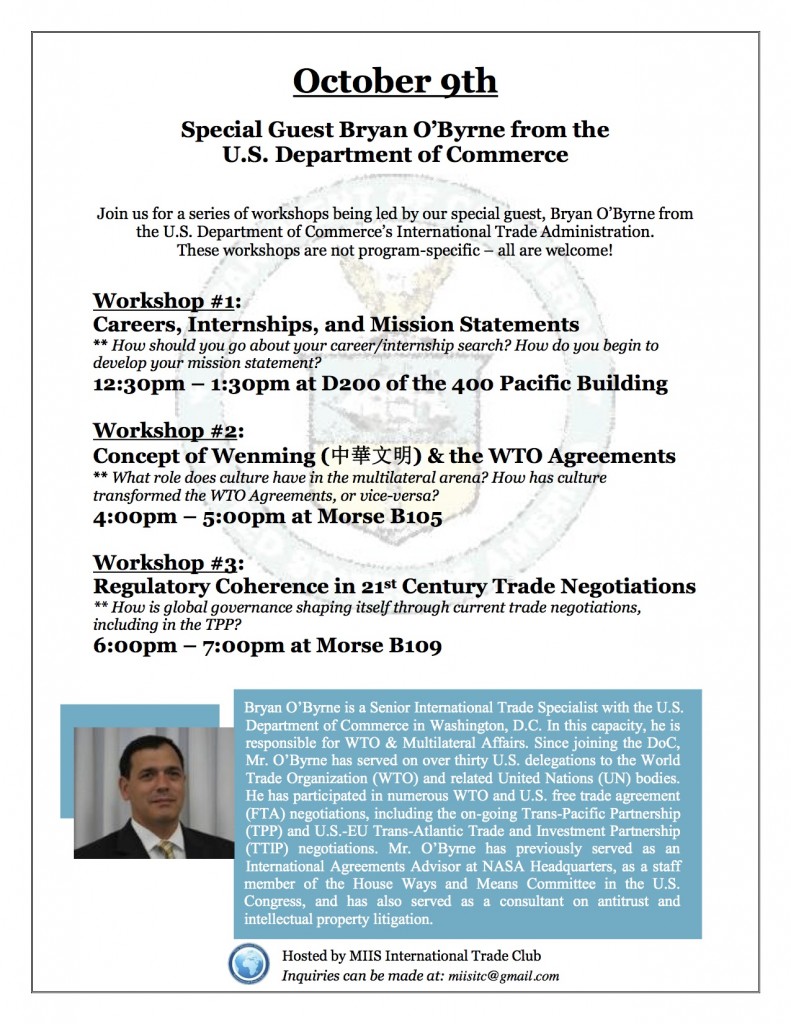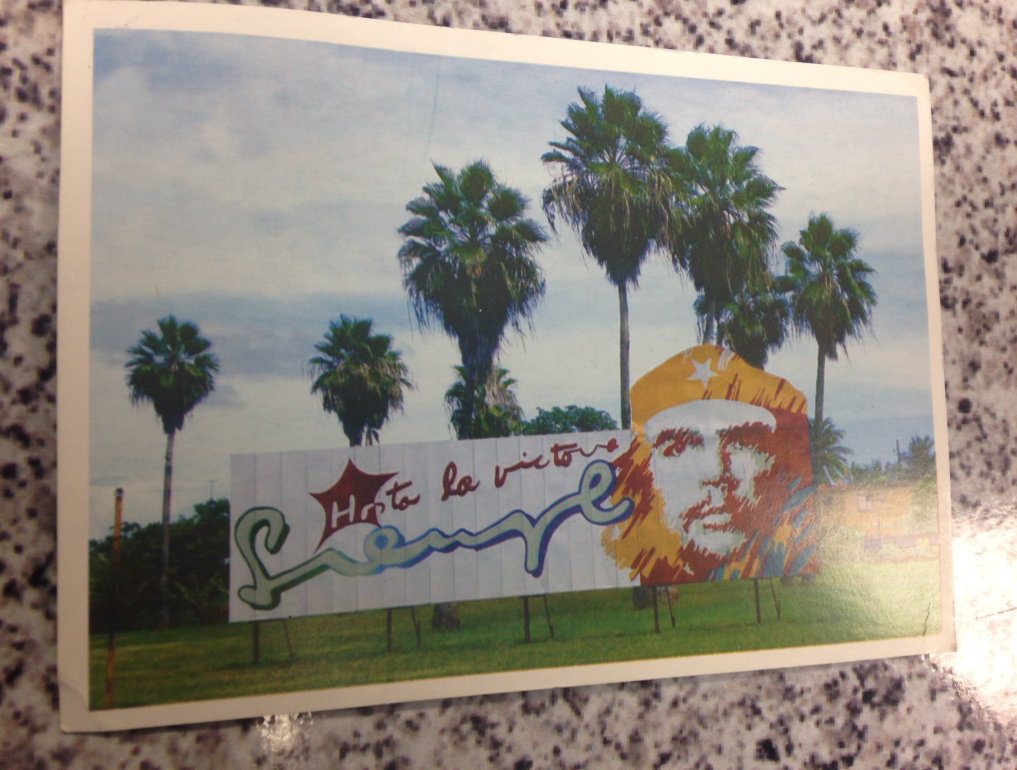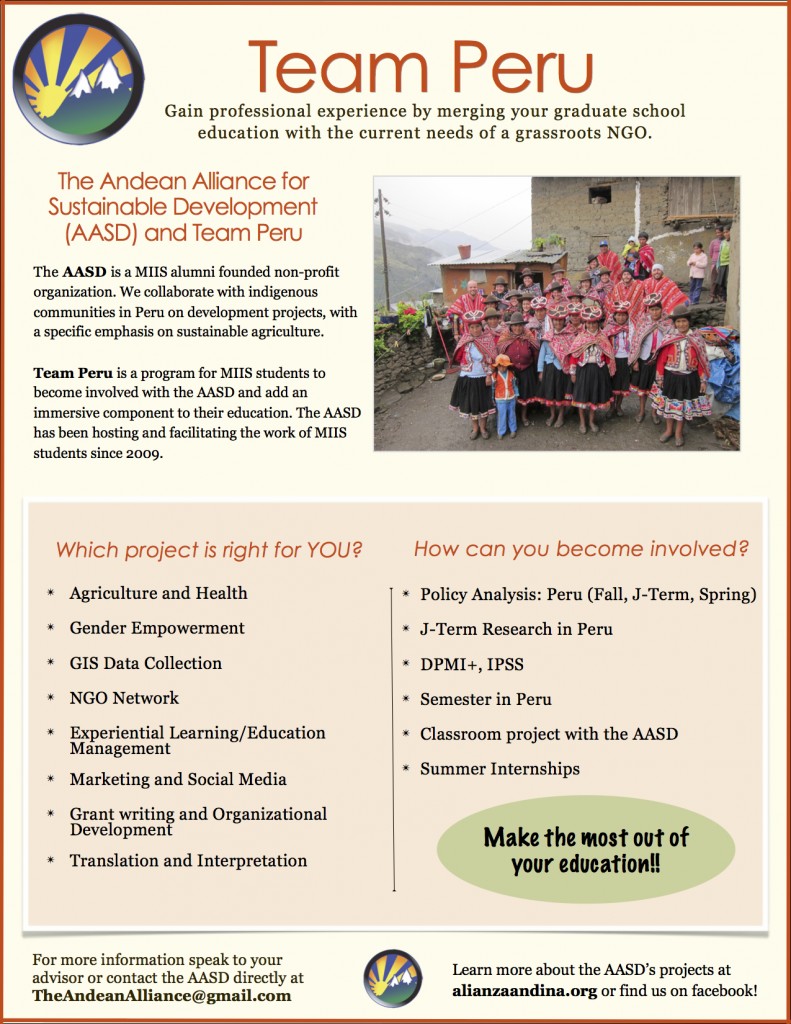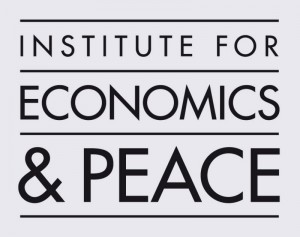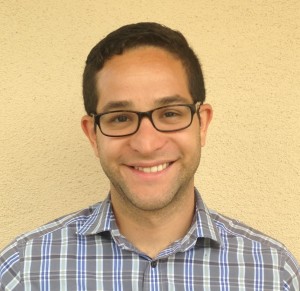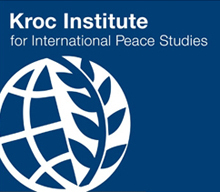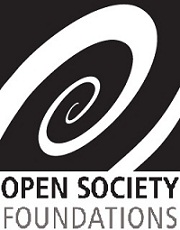Archive for IPSS
Monday, September 29th, 2014
Apple Pie and Pineapple Sorbet: U.S. and Cuban Nationalism
Why is Cuba such a contradiction? Because Cuba is characterized by everything I was told the world should not be! Socialist not democratic, communist not capitalist, systemic human rights violations, a dictatorship, inefficient, unproductive; should I continue? I was able to get a sense of this notorious island during a seven day immersive learning excursion with twenty-seven other MIIS students and the renowned Professor Jan Black.
There was a time when I imagined Cuba as a socialist utopia. I had thought Cuba was going to be the national anthropomorphization of Eugene V. Debs famous quote that is “opposing a social order where it is possible for one man who does absolutely nothing that is useful to amass a fortune of hundreds of millions of dollars, while millions of men and women who work all the days of their lives to secure barely enough for a wretched existence. But, there is no substitute for actually visiting the country – after seven days in Cuba, I’ve realized that the little island nation, and the United States, are a lot more complex than I was led to believe in the comfort of my Midwest upbringing.
As an American, I grew up on the smell of apple pie; lightly toasted crust, crisscrossed across the top, somehow evoking feelings of liberty, justice…righteous stuff. You see, Cuba, at least for United States citizens, is one gigantic contradiction and trying to digest and make sense of the country through the nationalistic viewpoint from which my mind has been programmed to think, whether I like it or not, is no easy task. Close your eyes and think about apple pie. Now, envision biting into pineapple sorbet. So, I apologize now if, and that is a big if, you get to the end of this blog and you walk away more confused than you started. That’s fine though. Cuba could be the poster child for the phrase; the more you know the less you think you know.
Our professor and guide Dr. Jan Black told us to experience Cuba using our five senses. I would like to take the liberty of taking you, my reader, along for the ride with the idea of trying to engage your five senses. Unfortunately, I am less likely to engage your sense of smell. But, here we go:
We met with all different types of people, from Cuban foreign ministers to a diplomat from the U.S. Interest Section. We also met with individual Cubans, both pro-government and oppositionist. We met with U.S. expats working with the Cuban health system and Cuban students studying international relations. What was so trying after listening to all of them was that you could easily pick each one up and place them into two buckets, Cuban Nationals (CN) or U.S. Nationals (USN). Whether we were speaking to Cuban oppositionists or expat sympathizers of the Cuban government their rhetoric fit, nicely, within these two buckets. Their world-views and indeed those of us students had been systematically crafted by the nations from which they grew up and regardless of their support for either side or not they continued to use rhetoric that perpetuated the conflict between the United States and Cuba. What was most contradictory of all was that these two worldviews of the same conflict were like hearing two completely different stories for two completely different historical events told perpetually for generations upon generations without change.
How are these national worldviews constructed within a citizenry? It is often much more subtle than one would assume. Irrespective of whether we understand nationalism as a positive or negative force, it is generally acknowledged that nationalism places the nation on the highest pedestal and viewed as the supreme agency of meaning, collective identity, and moral justification. Critically noting that one of the powerful ways in which nationalism becomes historically instated is through its presumption that the nation is sacred, likening it to be equivalent to the church. Interestingly, if nationalism is being valued as sacred within the population we can see its physical manifestation in the ritualized images of national leaders and national public ceremonies that are underscored by the nations presumed history of greatness. Harry Anastasiou, a professor of Conflict Resolution at Portland State University and world-renowned leader in the settlement process in Cyprus, goes as far to claim nationalism can be a justification for divine election.
Click here to read more
Monday, August 25th, 2014
Research Fellowship with Institute for Economics & Peace
The Institute for Economics and Peace is searching for a full-time Research Fellow to join their research team at their headquarters in Sydney, Australia. Click here to download full position description.
A Research Fellow will conduct research on topics related to the Global Peace Index, peace economics, development studies and peace and conflict studies.
Application Deadline: August 28th, 2014
Selection Criteria:
1. Master’s degree (PhD an advantage) in a combination of economics and/or statistics, international
relations or other social sciences discipline.
2. Minimum of three to five years professional experience conducting empirical research and
quantitative data analysis specifically related to a combination of social sciences, development
studies, economics, statistics and peace and conflict studies.
3. Experience working with governmental and non-governmental organisations (NGOs) on peace
economics, peace and conflict studies, and international development issues.
4. Experience handling large datasets and knowledge of R, SPSS, STATA, and other related econometric
packages is required. Ability to write code for R, SPSS or STATA and advanced Microsoft Excel skills.
5. Track record of demonstrable analytical and data visualisation skills.
6. Excellent verbal and written communication skills. Competence to undertake research assignments
and project manage teams with minimal supervision.
Applications to: CV and cover letter addressing the selection criteria and desired personal qualities to Lucie
Paleckova on info@economicsandpeace.org
Deadline for applications: 28 August, 2014
Website: www.economicsandpeace.org, www.visionofhumanity.org
Friday, August 22nd, 2014
Reflection Post IPSS Placement Presentations
On Tuesday August 19, the 2014 cohort of the International Professional Service Semester (IPSS) program conducted their placement presentations of their semester-long experience in front of a select group of faculty and staff. As Graduate Assistant for GSIPM Immersive Learning and Special Programs, I took an active role behind the scenes, taking on the logistics to ensure that each of the Fellows were able to connect to the designated conference rooms where an anxious audience was expected to learn about their experience.
The task was challenging, as I had to make sure that all the technical details were taken care of for the 23 fellows to be able to connect smoothly from several countries and across several time zones. However, the job gave the unique opportunity to participate in the sessions and learn about the amazing work that each of the fellows has been doing at each of their placements for the past 3-6 months.
As a MIIS student accepted to IPSS for Spring 2015 and currently looking for placement opportunities, listening to the students’ presentations solidified the notion that doing IPSS in Spring 2015 is the right choice for my future, and here is why:
Firstly, I was impressed by the way that each of the fellows presented him or herself. They were all confident and used technical language that made them sound like real subject matter experts. For a bit it was hard to believe that just a few months ago they were just students in the classroom like me, because I would expect that such level of professionalism and technical expertise would only come from seasoned professionals. I know for fact, that those are skills that can’t be necessarily learned in a classroom, which to me was a statement of the value of IPSS as an immersive learning option.
Secondly, none of the fellows mentioned having regretted doing IPSS and all of them were visibly happy with the end results of their placements. Even though, there were some difficulties – which are all part of the professional growth process – all of the fellows managed to overcome them and make the most out of their experience. When asked by faculty about what they would have done differently, the overwhelming majority answered that early preparation is key and in terms of defining their role and specific tasks. I, of course, adopted that reflection as a recommendation that will be implementing in the upcoming months.
Finally, when asked about future plans, the majority of fellows responded that thanks to the IPSS experience they were able to ensure employment either at their host organizations or at another location that they were introduced to thanks to their IPSS placements. This statement adds value to the notion that immersive learning ensures a solid bridging between the academic and professional worlds, which is very unique to the MIIS experience.
My congratulations go to each of the 2014 IPSS fellows for their success and I thank you all for being such great role models.
Julio Noguera is a Graduate Assistant for GSIPM Immersive Learning and Special Programs. At MIIS he is pursuing his MPA with a focus on Program Evaluation and Management. Before coming to MIIS, Julio spent 5 years in Washington, DC where he served as Junior Project Manager backstopping several multi-million dollar development projects in Africa, Latin America, the Caribbean and Asia. He received his BA in Economics, International Business and French from Westminster College in Missouri and participated in DPMI during the summer of 2007 as Davis UWC Fellow.
Friday, August 8th, 2014
Job Openings in Policy Research and Data Analysis
Research Associate in Policy Studies, Kroc Institute, University of Notre Dame
The Kroc Institute for International Peace Studies at the University of Notre Dame seeks applications for the position of Research Associate in Policy Studies. The Research Associate will work closely with the Director of Policy Studies at the Kroc Institute on research projects, curriculum development, and organizing research and education events both at Notre Dame and elsewhere.
Application deadline: August 8th
Open Data Analyst, Open Society Foundations, London or New York
The CODEX program seeks to leverage a wide range of open (and sometimes not-so-open) information relating to the extraction of oil, gas, and mineral resources in developing countries. The purpose of the work is to demonstrate, using innovative techniques and creative approaches to data-storytelling, how open data can be a powerful tool in the fight against mismanagement and plunder of natural resource wealth in the world’s poorest countries. This work would constitute a contribution to the growing field of “Open Government.”
Application deadline: August 17th
Monday, August 4th, 2014
Courage Under Fire: An Intimate Look at UN Peacekeeping
UNA-USA – Nationwide conference call on Wednesday, August 6 at 2 p.m. ET
with
Ken Payumo
Chief of the Peacekeeping Operations Support Section for the Department of Safety and Security, United Nations
Wednesday, August 6, 2 p.m. ET
U.S./Canada Dial-in: 866-454-4208
Passcode: 8136862
Please RSVP via email to membership@unausa.org.
What do you do when you are up against a government trying to harm its own people? As men with guns tried to enter the UN camp in Bor, South Sudan, Ken Payumo, a civilian officer in charge, stood up to the South Sudanese military when 12,000 refugees fled to the UN base for safety. His brave actions are thought to have saved thousands of lives.
Join us for a conversation with Mr. Payumo, who will provide a closer look at the day-to-day challenges of UN peacekeeping and give an update on the current crisis in South Sudan.
About our speaker:
Ken Payumo is currently the Chief of the Peacekeeping Operations Support Section for the Department of Safety and Security. This section is responsible for overseeing the security of all UN peacekeeping missions. Having more than 14 years of experience in the United Nations, Mr. Payumo’s UN service includes that of Legal and Policy Advisor, United Nations Transitional Administration in East Timor (UNTAET); Political Officer, Department of Peacekeeping Operations (DPKO)/Asia Middle East Division (AMED); Mission Management Officer (DPKO Police Division), and most recently Head of Office for Unity and later Jonglei states, United Nations Mission in South Sudan (UNMISS).
Prior to the UN, Mr. Payumo had served as a police officer in the New York City Police Department. Mr. Payumo is a citizen of the United States of America and was born in New York City.
-Text taken directly from e-mail from UNA-USA Membership membership@unausa.org
Wednesday, July 30th, 2014
U.S. TIP Grant Solicitation for research on Trafficking in Persons
Email from TIP Office Public Outreach [TIPOutreach@state.gov]
U.S. Department of State
Office to Monitor and Combat Trafficking in Persons
Competitive Grant Solicitation for Research on Trafficking in Persons in Supply Chains in Sub-Saharan Africa
The Office to Monitor and Combat Trafficking in Persons announces an open competition for funding of one or more projects to answer the following research question: How do supply chains that touch sub-Saharan Africa operate and intersect with trafficking in persons, and prevent trafficking in sub-Saharan Africa?
Using the results of this research question, the successful applicant will develop a highly detailed typology across sectors, commodities, regions or other subdivisions that become apparent during the research. The goal of the research is to enable governments and businesses to identify risks and best practices of programs, policies, and laws to combat those risks.
The request for proposals is posted on www.grantsolutions.gov and www.grants.gov under funding opportunity number AT-ATC-14-009. To be considered for funding, proposals must be submitted by Wednesday, August 27, 2014 at 5:00 p.m. Eastern Daylight Time.
U.S.-based and foreign non-profit organizations, for-profit organizations, non-governmental organizations (NGOs), public international organizations (PIOs), and institutions of higher education are eligible to apply.
Monday, July 28th, 2014
DPMI: A learning journey
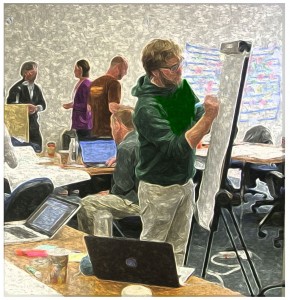
Josh Fleming (MA IPS ’15) participates in a facilitation exercise during the second week of DPMI Monterey this June.
I had heard repeatedly on campus that DPMI (Design, Partnering, Management and Innovation) is one of the most useful courses you can take. I found this hard to believe at first, but now I agree. If you haven’t taken this leadership training in international development project management and social change then you should reconsider.
You will walk away from the DPMI training having learned some ground-breaking and ‘tried and true’ tools to solving your next problem, motivating your staff or making your next big partnership. Tools that break down these processes into quantifiable, qualifiable methods to be used at a given moment or throughout the lifespan of a project.
If you are a non-profit guru, a development practitioner in training, or a social change maker then you will notice, quickly, that these tools and capacities that DPMI finds so important are actually pretty important. This is how USAID, and other major non-profit employers do it, and whether you like it or not USAID often sets the standard. Additionally, from the United Nations to grassroots organizations, from CSR departments to State department recruiters–most are looking for project management skills. DPMI fits them nicely into the longest three weeks of your life (Yes, I’ve thrown in a bit of sarcasm). It’s worth it though. I implore you to find one job posting that doesn’t ask for project management skills.
Click here to read more
Tuesday, July 15th, 2014
The IPSS Experience: Jia Ren

The International Professional Semester Service (IPSS) program has provided hundreds of MIIS graduates with the opportunity to head start their professional career, while serving in an international organization as junior professional staff member. Some fellows have even used the IPSS experience to catapult themselves to become subject matter experts, as it is the case of Jia Ren (MAIPS Trade, Investment & Development 2014).
For her placement at the Bay Area Council Economic Institute (BACEI), Jia contributed to a report entitled: Trade in the Bay Area: Investment and Global Financial Flows. The work, led by BACEI and sponsored by HSBC Bank USA, analyzed the trade, investment and commercial relations between the Bay Area and its major global trading partners, especially China, focusing on informing business leaders and other decision-makers about the potential for increased business growth in the region.
International Professional Service Semester (IPSS) is an immersive learning experience, integrating academic work with professional experience. Students serve as junior professional staff members in an international organization while producing specific deliverables for academic credit. The IPSS program is offered through the Graduate School of International Policy and Management (GSIPM) during the spring semester. For more information about IPSS please visit: go.miis.edu/ipss
Wednesday, July 9th, 2014
Announcing IPSS Placement Presentations on August 19
For 3 to 6 months, each of the 2014 IPSS (International Professional Service Semester) participants have engaged in a series of internships and short term positions. These experiences have allowed them to utilize the concepts and tools learned in previous semesters, in a real professional setting. From working towards building resilience of coastal areas in Monterey county to eradicating polio in rural India, each of the IPSS participants have had the unique opportunity to use their skills, capacities and passion to “Be the solution” of the world’s more pressing issues.
On August 19, the twenty-three 2014 IPSS participants will have the opportunity to present the work they have been carrying out previous months to the MIIS Community. Each presentation will be 15 minutes long and it would be either in-person, over Skype or through an engaging and creative video. After the presentation, each participant will have the chance to answer questions or to take some feedback from faculty, staff and other members of the MIIS community.
Further information on times and location for each of the presentations can be found here (locations and times might change).
Even though all presentations are open to the MIIS Community at large, seating is limited, so we encourage anyone interested in attending to RSVP by sending a short note to ipss@miis.edu indicating the session(s) they would like to attend.
International Professional Service Semester (IPSS) is an immersive learning experience, integrating academic work with professional experience. Students serve as junior professional staff members in an international organization while producing specific deliverables for academic credit. The IPSS program is offered through the Graduate School of International Policy and Management (GSIPM) during the spring semester. For more information about IPSS please visit: go.miis.edu/ipss
